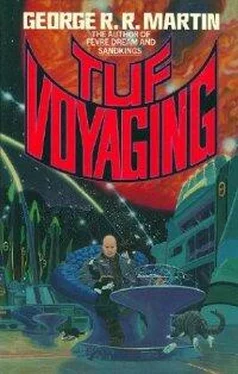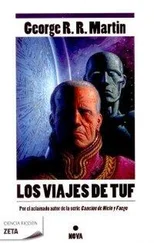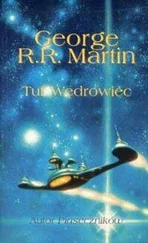“It would certainly have an adverse effect,” Josen Rael admitted.
Tolly Mune made a loud crude noise at him. “Our economy will be destroyed,” she said bluntly.
Rael was sweating heavily now, trickles of moisture running down the broad, domed forehead. He mopped at the moisture with a pocket cloth. “Then you must see that it doesn’t happen, Portmaster Mune. You must see that it doesn’t come to that.”
“How?”
“Buy the Ark ,” he said. “I delegate full authority to you, since you seem to understand the situation so well. Make this Tuf person see reason. The responsibility is yours.” He nodded, and the screen went black.
On S’uthlam, Haviland Tuf played the tourist.
It could not be denied that the world was impressive, in its way. During his years as a trader, hopping from star to star in the Cornucopia of Excellent Goods at Low Prices , Haviland Tuf had visited more worlds than he could easily remember, but he would be unlikely to forget S’uthlam any time soon.
He had seen a goodly number of breathtaking sights: the crystal towers of Avalon, the skywebs of Arachne, the churning seas of Old Poseidon and the black basalt mountains of Clegg. The city that was S’uthlam—the old names were only districts and neighborhoods now, the ancient cities having grown into one swollen megalopolis centuries ago—rivaled any of them.
Tuf had a certain fondness for tall buildings, and he gazed out upon the cityscape by both day and night—on observation platforms at one kilometer, two, five, nine. No matter how high he ascended, the lights went on and on, sprawling across the land endlessly in all directions, with nowhere a break to be seen. Square and featureless forty- and fifty-story buildings stood cheek-to-jowl in endless rows, crowding each other, living in the perpetual shadow of mirrored towers that rose around them to drink the sun. Levels were built upon other levels that had been built upon still others. The moving sidewalks crossed and crisscrossed in patterns of labrynthine intricacy. Beneath the surface ran a network of vast subterranean roads where tubetrains and delivery capsules hurtled through the darkness at hundreds of kays per hour, and beneath the roads were basements and sub-basements and tunnels and underways and malls and sub-housing, a whole second city that burrowed as far below the ground as its mirrored sibling ascended above it.
Tuf had seen the lights of the metropolis from the Ark; from orbit, the city swallowed half a continent. From the surface, it seemed large enough to swallow galaxies. There were other continents; they, too, blazed by night with the lights of civilization. The sea of light had no islands of darkness within it; the S’uthlamese had no room to spare for luxuries like parks. Tuf did not disapprove; he had always thought parks to be a perverse institution, designed principally to remind civilized humanity how raw and crude and uncomfortable life had been when they had been forced to live it in nature.
Haviland Tuf had sampled a great variety of cultures in his wanderings, and he judged the culture of the S’uthlamese to be inferior to none. It was a world of variety, of dizzying possibilities, of a richness that partook both of vitality and decadence. It was a cosmopolitan world, plugged into the network that linked the stars, freely plundering the music, drama, and sensoria imported from other worlds, and using those unceasing stimuli to endlessly transform and mutate its own cultural matrix. The city offered more modes of recreation and more entertainment of more varied sorts than Tuf had ever seen in any one place before—sufficient choices to occupy a tourist for several standard years, if one desired to taste it all.
During his years of travel, Haviland Tuf had seen the advanced science and technological wizardry of Avalon and Newholme, Tober-in-the-Veil, Old Poseidon, Baldur, Arachne, and a dozen other worlds out on the sharpened leading edge of human progress. The technology demonstrated on S’uthlam was equal to the most advanced of them. The orbital elevator itself was an impressive feat—Old Earth was supposed to have built such constructs in the ancient days before the Collapse, and Newholme had raised one once, only to have it fall during the war, but nowhere else had Tuf ever observed such a colossal artifact, not even on Avalon itself, where such elevators had been studied and rejected on the grounds of economy. And the slidewalks, the tubetrains, the manufactories, all were advanced, and efficient. Even the government seemed to work.
S’uthlam was a wonder world.
Haviland Tuf observed it, traveled through it, and sampled its marvels for three days before he returned to his small, cramped, premiere-class sleeping quarters on the seventy-ninth floor of a tower hotel, and summoned the host. “I wish to make arrangements for an immediate return to my ship,” he said, seated on the edge of the narrow bed he had summoned from a wall, the chairs being uncomfortably small. He folded large white hands neatly atop his stomach.
The host, a tiny man barely half Tuf’s height, seemed nonplussed. “It was my understanding that you were to stay for another ten days,” he said.
“That is correct,” said Tuf. “Nonetheless, it is the nature of plans to be changed. I wish to return to orbit as soon as is conveniently possible. I would be most grateful if you would see to the arrangements, sir.”
“There’s so much you haven’t seen yet!”
“Indeed. Yet I find that what I have seen, however small a sample of the whole it may be, has been more than sufficient.”
“You don’t like S’uthlam?”
“It suffers from an excess of S’uthlamese,” Haviland Tuf replied. “Several other flaws might also be mentioned.” He held up a single long finger. “The food is abysmal, for the most part chemically reformulated, largely without taste, of a distinctly unpleasant texture, full of unusual and disquieting colors. Moreover, the portions are inadequate. I might also be so bold as to mention the constant intrusive presence of a large number of newsfeed reporters. I have learned to recognize them by the multifocus cameras they wear in the center of their foreheads as a third eye. Perhaps you have observed them lurking about your lobby, sensorium, and restaurant. By my rough estimate, there seem to be about twenty of them.”
“You’re a celebrity,” the host said, “a public figure. All of S’uthlam is interested in learning about you. Surely, if you don’t wish to grant interviews, the peeps haven’t dared intrude on your privacy? The ethics of the profession . . . ”
“Have no doubt been observed to the letter,” Haviland Tuf finished, “as I must concede that they have kept their distance. Nonetheless, each night when I have returned to this insufficiently large room and accessed the newsfeeds, I have been welcomed by scenes of myself looking over the city, eating tasteless rubbery food, visiting various scenic tourist attractions, and entering sanitary facilities. Vanity is one of my great faults, I must confess, but nonetheless, the charm of this notoriety has quickly palled. Moreover, most of their camera angles have been unflattering in the extreme, and the humor of the newsfeed commentators has bordered on being offensive.”
“Easily solved,” the host said. “You might have come to me earlier. We can rent you a privacy shield. It clips on the belt, and if any peep approaches within twenty meters, it will jam his third eye and give him a splitting headache.”
“Less easily solved,” said Tuf impassively, “is the total lack of animal life I have observed.”
“Vermin?” the host said, with a horrified look. “You’re upset because we have no vermin ?”
“Not all animals are vermin,” said Haviland Tuf. “On many worlds, birds, canines, and other species are kept and cherished. I myself am fond of cats. A truly civilized world preserves a place for felines, but on S’uthlam it appears the populace would find them indistinguishable from lice and bloodworms. When I made the arrangements for my visit here, Portmaster Tolly Mune assured me that her crew would take care of my cats, and I accepted said assurances, but if indeed no S’uthlamese has ever before encountered an animal of a species other than human, I believe I have just cause to wonder as to the quality of the care they are presently receiving.”
Читать дальше












